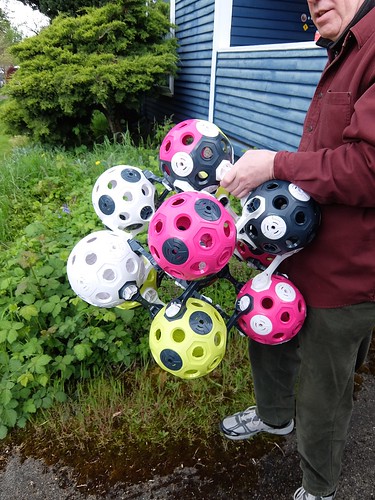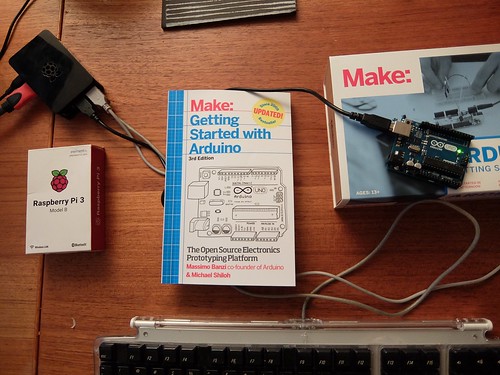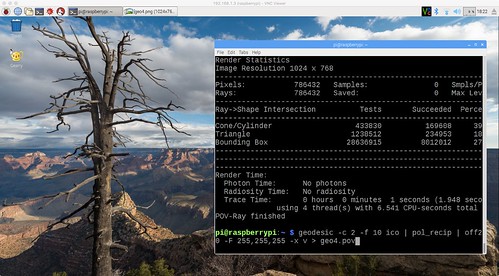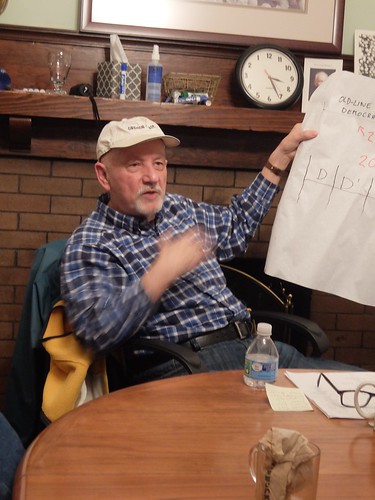Friday, April 28, 2017
Portland Design Week 2017
Continuing the theme of HP4E, Hexapents for Everyone, today was the long-awaited debut of C6XTY as a camera-ready product.
Glenn and Deke came over to my place for the occasion, with Sam Lanahan, the inventor, bringing inventory fresh off the ship from China, more on the way. You'll be learning more about this invention in future blog posts.
Good catching up with Trevor Blake this week. He knows my HP4E campaign from the "design science" angle as well.
Likewise in the spirit of Design Week, I was able to get the Raspberry Pi talking to the Arduino Uno, by downloading and decompressing a nightly build of the Processing development environment.
As mentioned earlier, I'm plowing through a MOOC on Coursera, about the Internet of Things (IoT).
Wednesday, April 26, 2017
Wanderers 2017.4.26
I've been shaking a cold since Earth Day, last Saturday. Peter, retired librarian, used to working with the public, says those cold viruses usually take about sixteen hours to incubate to the point of producing a notable physiological response, so the notion that I actually contracted the virus at the march, or later at the studio in Sellwood, would be pure science fiction on my part.
This morning's challenge was to ssh into the Raspberry Pi on the same network for file copying purposes. I was unsuccessful in entering a valid password, so had to venture to the basement in person to yank the memory stick, without ejecting properly. Yeah that sounds bad. Psychoanalyze me why don't ya? So the point was to get anti-aliasing working better on these high frequency hexapents I'm doing for Glenn, a specimen above should be coming from Flickr. How long did that last?
However the workflow, starting with Adrian's antiprism, through POV-Ray (the rendering software), ending in a PNG file, is supposed to go on to the making of transparencies. The shading or shadowing the ray tracer applies by default, is maybe command line turnoff-able. In lieu of that, I spent some thirty minutes dumping paint buckets (a tiny icon) of perfectly white paint (255, 255, 255), atop the bazillions of hexagons, a few pentagons. Not that many actually. However I was at least forty minutes late to Glenn's talk, amidst other unrelated distractions such as forgetting where I'd put my boots.
Today I'm co-teaching in an elementary school and must remember to pack an HDMI cable, as that's our ticket to the projection screen, where MIT Scratch will be revealed to these second graders. They're ready, having prepped with simpler games on the company Chromebooks. I wonder if we'll have enough mice this week. Tracking pad practice is important too of course.
Later, I'm on the Internet radio, closed circuit, with my highly qualified adults. That's a gig I've been hosting for awhile now. The format is quite similar to what you'll find in my Youtube channel, with regard to Synergetics, say, except in this context it's all Python, from built-in to user types, callables (objects that "eat"), making your own, up through context managers, generators, the usual object oriented patterns, found in so many languages.
Last week I shared the news from Stanford, about Javascript replacing Java as an "intro to" programming language. Harvard's CS50 has been using MIT Scratch same as us, just for getting feet wet, before plunging into C and out the other shore (by week eight) in the lush jungle of Python, and other very high level languages. One appreciates the latter more having experienced the austere starkness of simply C.
Glenn has taken to coloring the hexapents to bring out patterns. I'm not going to recap all that here. He had a copy of Popko's book on the table, but didn't lug the Sloterdjik volumes I noticed. He might as well have, but then pretty soon you're introducing a whole truckload of volumes, just for the one talk. Why should logistics be that hard, right? The talk was well attended. Barbara Stross, Milt Markowitz, Steve Mastin, Jon Bunce, Deke Bridges, Don Wardwell, Steve Crouch, Glenn and myself.
This morning's challenge was to ssh into the Raspberry Pi on the same network for file copying purposes. I was unsuccessful in entering a valid password, so had to venture to the basement in person to yank the memory stick, without ejecting properly. Yeah that sounds bad. Psychoanalyze me why don't ya? So the point was to get anti-aliasing working better on these high frequency hexapents I'm doing for Glenn, a specimen above should be coming from Flickr. How long did that last?
However the workflow, starting with Adrian's antiprism, through POV-Ray (the rendering software), ending in a PNG file, is supposed to go on to the making of transparencies. The shading or shadowing the ray tracer applies by default, is maybe command line turnoff-able. In lieu of that, I spent some thirty minutes dumping paint buckets (a tiny icon) of perfectly white paint (255, 255, 255), atop the bazillions of hexagons, a few pentagons. Not that many actually. However I was at least forty minutes late to Glenn's talk, amidst other unrelated distractions such as forgetting where I'd put my boots.
Today I'm co-teaching in an elementary school and must remember to pack an HDMI cable, as that's our ticket to the projection screen, where MIT Scratch will be revealed to these second graders. They're ready, having prepped with simpler games on the company Chromebooks. I wonder if we'll have enough mice this week. Tracking pad practice is important too of course.
Later, I'm on the Internet radio, closed circuit, with my highly qualified adults. That's a gig I've been hosting for awhile now. The format is quite similar to what you'll find in my Youtube channel, with regard to Synergetics, say, except in this context it's all Python, from built-in to user types, callables (objects that "eat"), making your own, up through context managers, generators, the usual object oriented patterns, found in so many languages.
Last week I shared the news from Stanford, about Javascript replacing Java as an "intro to" programming language. Harvard's CS50 has been using MIT Scratch same as us, just for getting feet wet, before plunging into C and out the other shore (by week eight) in the lush jungle of Python, and other very high level languages. One appreciates the latter more having experienced the austere starkness of simply C.
Glenn has taken to coloring the hexapents to bring out patterns. I'm not going to recap all that here. He had a copy of Popko's book on the table, but didn't lug the Sloterdjik volumes I noticed. He might as well have, but then pretty soon you're introducing a whole truckload of volumes, just for the one talk. Why should logistics be that hard, right? The talk was well attended. Barbara Stross, Milt Markowitz, Steve Mastin, Jon Bunce, Deke Bridges, Don Wardwell, Steve Crouch, Glenn and myself.
Monday, April 17, 2017
Learning Programming
I'm always learning programming, or "how to code", coming from several angles. I'm ever curious to learn more Javascript, what with it's being a moving target and now having Node.
I've always been a REPL guy, meaning I like my languages interactive. dBase was my home base for so many years, flavors thereof, up through Visual FoxPro version 9, a Microsoft product. REPL means Read (the user's command), Evaluate (perform said service), Print (share results), Loop (do it again!).
I'm not some super-duper programmer who quickly embraces new skills or whatever. I struggle to have a niche in some environment with a fast moving current. Geeks have that constant battle to remain current in a few areas, while lagging in others, and foraying on ahead in yet other respects.
Tonight I focused on input and output through file objects, using JSON and CSV files for my main examples. I had Facebook stuff about me, sucked from their API some time ago, now just a text fragment. We played "Where's Waldo" against data structures. Kinda fun.
I've always been a REPL guy, meaning I like my languages interactive. dBase was my home base for so many years, flavors thereof, up through Visual FoxPro version 9, a Microsoft product. REPL means Read (the user's command), Evaluate (perform said service), Print (share results), Loop (do it again!).
I'm not some super-duper programmer who quickly embraces new skills or whatever. I struggle to have a niche in some environment with a fast moving current. Geeks have that constant battle to remain current in a few areas, while lagging in others, and foraying on ahead in yet other respects.
Tonight I focused on input and output through file objects, using JSON and CSV files for my main examples. I had Facebook stuff about me, sucked from their API some time ago, now just a text fragment. We played "Where's Waldo" against data structures. Kinda fun.
Thursday, April 13, 2017
Worldly Affairs
The Synergetics 101 playlist is complete at least for now. I've turned my thinking towards Synergetics for Dummies or whatever. In the meantime, I'm content to watch imitators pick up the dropped baton and carry forward and/or jump on the bandwagon.
I spent some time this morning, in response to an email, researching InnerSource, which is now mostly what OSCON is about.
Portland, an Open Source capital, whatever that means, no longer gets to have OSCON.
Moving what used to be the Perl conference to Austin sends a new message. Portland is no longer in the loop as much. I wasn't able to offer any suggestions.
My MOOC is going well. I finished the first week, however the way Coursera works my report on the "AI bicycle network" has to be evaluated by peers.
I've been talking to someone just recently in Shanghai and comparing notes regarding how cities now may provide bicycle transportation to people who don't want the headache of actually owning such a device.
Portland's system is not quite the same as Shanghai's, in terms of scale obviously, but also in many other ways.
What's going on in the background these days in the mainstream media is some cabal with a lot of friends in high places is going ballistic about stuff. Literally.
So-called North Korea is angering to various species of control freak, as it might be a threat of some kind someday.
A high ranking Pentagon employee just decided to use that establishment's biggest non-nuke bomb on an enemy. They say that sent some kind of message to the defiant NK. I'm sure that will inspire more patriotism among Kim Jong Un fans.
Then of course many people watched the cruise missile show on CNN etc., with viewers invited to gather around the HDTVs in sports bars, and maybe cheer on social media. Many complied I'm sure, though some maybe more out of a sense of obedience. North Koreans understand I'm sure.
Quakers don't usually find outward war either sexy or attractive, so in my Portland-based circles we probably weren't as glued to our screens as some.
We don't ignore worldly affairs though as the brand of Quakerism I practice is not about grooming Friends to become hermits, much as the Internet of Things is making such lifestyles more attractive.
I don't know who at West Point is in charge of teaching about literary movements and philosophy, American history. You can't really fight for a nation you haven't studied or don't understand. I'm pretty sure they read Wittgenstein at least.
InnerSource means using a lot of the same technologies used by public developers, including version control, Agile, collaborative teams. How open source gained so much market share in the first place is the subject of Revolution OS, dated by now, but still worth a look.
One may own a bicycle privately, and still choose to use a public bicycle routinely. Software works the same way. Many people who work on public projects and contribute their time liberally to such endeavors, are also hired guns inside of private organizations, where their work is appreciated by a smaller audience.
Friday, April 07, 2017
Data Science
Yesterday was bright and sunny, and I got out on my bicycle, first time this year. Today is dark and stormy, with 50 mph gusts, quite melodramatic.
I got data science on my plate, more specifically pandas, not the animals, but the spreadsheet on steroids built from NumPy, available in the Python ecosystem.
Last Monday (at the start of this week), I was reading in from roller_coasters.csv, from within a Jupyter Notebook. I'll get a screen shot.
Note that multi-dimensional panels, with more axes than dataframes, are multi-dimensional in a somewhat different sense than in regular polytopes. Sometimes just adding a metric (distance formula) is all you need to bridge a polyhedron to a database.
I've signed up for a MOOC as well, in order to squeeze more value from the Raspberry Pi in the basement. I've got a sponsor for that one.
My taxes went in weeks ago, however I have some loose ends to take care of. I need to get printer ink for the Epson (also a scanner).
Thursday, April 06, 2017
More Ethnography ("Quakers")
Replying to a blogger on QuakerQuaker (Q2):
The model we've developed is one of Peace & Social Concerns giving a platform to activists to compare notes, somewhat in your Ulster warring groups model. These would be the warlords of various activist factions, perhaps drawn to Quakerism for its "judo" (right stuff), an opportunity to hone skills.
In our meeting that committee currently includes a Palestinian-Gazan rights activist, an anti weapons-in-space pro (my mom), David Chandler (Nine Eleven) and so on. The Racial Justice discussion group and listserv runs as a subcommittee (ad hoc), much as our ad hoc Gender group has been under Worship and Ministry (W&M).
Yet each P&SC member does battle alone, with other networks (mom with WILPF), as a "token Quaker" one might say (we're too small in number to be anything but token in most worlds).
The upshot: the Business Meeting as a whole is rarely tasked with worldly affairs "stance" minutes. W&M is more focused on "who comes through the door" PR, i.e. the quality of Meeting for Worship and do we welcome Goths or whatever ethnicity.
In practice, what Business Meeting gets tasked with is more around creating a safe space, which in recent years has meant a lot of focus on gender, given Portland is a gender-bender capital. Not every meeting is dealing with the same themes at the same time. This meeting has been through other chapters.
What we call the Seifert Doctrine (named for one of our elders), is "Peace & Social Concerns shall not serve as 'the conscience of the meeting'" which is another way of saying its activists need to bring their own gravitas to the table, as there's no implicit endorsement of their actions by some Religious Society.
We do have "explicit endorsement" which may be sought. In our jargon a "released Friend" has a prized privileged exemption from committee duties and chores, freeing up time to share ministry, perhaps with a traveling minute of introduction -- a Clearness and ongoing Support committee would be expected in the background. Membership on Peace & Social Concerns does not confer such exalted status, but does serve the same support committee functions (activists consulting with activists).
In sum, we're a safe harbor for many who'd like a place of worship, a meeting, they don't feel defensive in, or about. For many, a Quaker meeting is that sanctuary, but without enforcement on the meeting's part of any strict conformity in how one chooses to participate in secular affairs, though we'd normally expect non-violence, truth telling, and plain speech from a Friend. One of our number, Lew Frederick, is a state senator. He hasn't time for committee memberships.
As another frequenter of Quaker meetings, I'm likewise free, without explicit endorsement, to go out there and do my Trucker Exchange Program or whatever, while others fight for refugees, wage war on false news, or plan realistically for climate change and eco-cleanup. Joe, not on Peace and Social Concerns, works a lot with Guatemalans (he and his wife go there and help out).
We don't have a Program Committee these days, but it's a relatively easy thing to book the meeting room for workshops and study sessions. We had one of those on Iran the other day, Diane showing slides from her recent trip.
The model we've developed is one of Peace & Social Concerns giving a platform to activists to compare notes, somewhat in your Ulster warring groups model. These would be the warlords of various activist factions, perhaps drawn to Quakerism for its "judo" (right stuff), an opportunity to hone skills.
In our meeting that committee currently includes a Palestinian-Gazan rights activist, an anti weapons-in-space pro (my mom), David Chandler (Nine Eleven) and so on. The Racial Justice discussion group and listserv runs as a subcommittee (ad hoc), much as our ad hoc Gender group has been under Worship and Ministry (W&M).
Yet each P&SC member does battle alone, with other networks (mom with WILPF), as a "token Quaker" one might say (we're too small in number to be anything but token in most worlds).
The upshot: the Business Meeting as a whole is rarely tasked with worldly affairs "stance" minutes. W&M is more focused on "who comes through the door" PR, i.e. the quality of Meeting for Worship and do we welcome Goths or whatever ethnicity.
In practice, what Business Meeting gets tasked with is more around creating a safe space, which in recent years has meant a lot of focus on gender, given Portland is a gender-bender capital. Not every meeting is dealing with the same themes at the same time. This meeting has been through other chapters.
What we call the Seifert Doctrine (named for one of our elders), is "Peace & Social Concerns shall not serve as 'the conscience of the meeting'" which is another way of saying its activists need to bring their own gravitas to the table, as there's no implicit endorsement of their actions by some Religious Society.
We do have "explicit endorsement" which may be sought. In our jargon a "released Friend" has a prized privileged exemption from committee duties and chores, freeing up time to share ministry, perhaps with a traveling minute of introduction -- a Clearness and ongoing Support committee would be expected in the background. Membership on Peace & Social Concerns does not confer such exalted status, but does serve the same support committee functions (activists consulting with activists).
In sum, we're a safe harbor for many who'd like a place of worship, a meeting, they don't feel defensive in, or about. For many, a Quaker meeting is that sanctuary, but without enforcement on the meeting's part of any strict conformity in how one chooses to participate in secular affairs, though we'd normally expect non-violence, truth telling, and plain speech from a Friend. One of our number, Lew Frederick, is a state senator. He hasn't time for committee memberships.
As another frequenter of Quaker meetings, I'm likewise free, without explicit endorsement, to go out there and do my Trucker Exchange Program or whatever, while others fight for refugees, wage war on false news, or plan realistically for climate change and eco-cleanup. Joe, not on Peace and Social Concerns, works a lot with Guatemalans (he and his wife go there and help out).
We don't have a Program Committee these days, but it's a relatively easy thing to book the meeting room for workshops and study sessions. We had one of those on Iran the other day, Diane showing slides from her recent trip.
Wednesday, April 05, 2017
Experiments in Social Engineering
Usually I entitle Wanderers meetups with a "star date" like in Star Trek, YYYY-MM-DD format, however this was closer to an ISEPP presentation in terms of polish. Peter Bechtold has done a lot of homework, and we enjoyed the presence of first-timers, another hallmark of a capital-e Event.
Peter's topic was both a quest and a conclusion. His quest is for a better explanation of the "coastalization" of US politics, with Blue states hugging left and right coastlines with mostly Red in the middle. This polarization mirrors the loss of a political middle. How does one continue applying the old structures amidst such a sea-change in the political climate?
His conclusion is in part prescriptive: the Canadian system is more democratic, in letting more people vote their conscience, with a peer group, versus voting against the lesser of two evils. The average USer is now facing the double-headed hydra of a schizophrenic out-of-control Uncle Sam. Is government governable?
The US system, as designed, heaps power on the two party system and leverages any challenge pretty much to the sidelines as a matter of course. The winner take all bipolar infrastructure makes it well-nigh impossible for the double-headed hydra to die, or even share power. Alienation is the outcome, and low voter turnout.
We learned a lot about other experiments in social engineering. Lebanon treats specific ethnic groups as axiomatic and assigns specific government roles to these orders, mostly bounded in religious terms, with several flavors of Christian and Muslim. When we get to Israel, that's when government dissects into more flavors of Jewish than may express elsewhere. Prime Ministers need to contrive allegiances and alliances.
Peter worked in the State Department for many years, having emigrated from Germany and earned his several degrees (two from Princeton). He studied how Sudan first adapted voting rights to its needs, first in deciding how independent of Egypt to become. He currently teaches in the Department of Politics at Portland State.
During the Q&A, I argued that the more politically literate needn't begrudge the "one person one vote" principle (children excepted), even though some budget relatively little time to stay informed. The act of voting is but one of endless ways to participate in a democracy. Transmute that literacy into political effectiveness in other ways. I'd say Peter does that. His willingness to present at Wanderers is proof enough. I also brought up the latest Palast movie.
That being said, some systems do hand out more than one vote to some people. Lets remember too, that USers vote in more elections than for USG-defined offices. Corporations, universities, other entities, have their governing bodies, any of which may implement some type of voting mechanism. For example I vote for Python Software Foundation board members, by means of electronic ballot.
Also, as came up in discussion, many people have dual citizenship and as such are entitled to vote in more than one election. Also, not all nations naturalize their native born, meaning children may inherit nationality from the parents and not from the surrounding state. The US extends citizenship to babies born within its borders, more an exception than the rule.
Peter's topic was both a quest and a conclusion. His quest is for a better explanation of the "coastalization" of US politics, with Blue states hugging left and right coastlines with mostly Red in the middle. This polarization mirrors the loss of a political middle. How does one continue applying the old structures amidst such a sea-change in the political climate?
His conclusion is in part prescriptive: the Canadian system is more democratic, in letting more people vote their conscience, with a peer group, versus voting against the lesser of two evils. The average USer is now facing the double-headed hydra of a schizophrenic out-of-control Uncle Sam. Is government governable?
The US system, as designed, heaps power on the two party system and leverages any challenge pretty much to the sidelines as a matter of course. The winner take all bipolar infrastructure makes it well-nigh impossible for the double-headed hydra to die, or even share power. Alienation is the outcome, and low voter turnout.
We learned a lot about other experiments in social engineering. Lebanon treats specific ethnic groups as axiomatic and assigns specific government roles to these orders, mostly bounded in religious terms, with several flavors of Christian and Muslim. When we get to Israel, that's when government dissects into more flavors of Jewish than may express elsewhere. Prime Ministers need to contrive allegiances and alliances.
Peter worked in the State Department for many years, having emigrated from Germany and earned his several degrees (two from Princeton). He studied how Sudan first adapted voting rights to its needs, first in deciding how independent of Egypt to become. He currently teaches in the Department of Politics at Portland State.
During the Q&A, I argued that the more politically literate needn't begrudge the "one person one vote" principle (children excepted), even though some budget relatively little time to stay informed. The act of voting is but one of endless ways to participate in a democracy. Transmute that literacy into political effectiveness in other ways. I'd say Peter does that. His willingness to present at Wanderers is proof enough. I also brought up the latest Palast movie.
That being said, some systems do hand out more than one vote to some people. Lets remember too, that USers vote in more elections than for USG-defined offices. Corporations, universities, other entities, have their governing bodies, any of which may implement some type of voting mechanism. For example I vote for Python Software Foundation board members, by means of electronic ballot.
Also, as came up in discussion, many people have dual citizenship and as such are entitled to vote in more than one election. Also, not all nations naturalize their native born, meaning children may inherit nationality from the parents and not from the surrounding state. The US extends citizenship to babies born within its borders, more an exception than the rule.
Subscribe to:
Comments (Atom)







